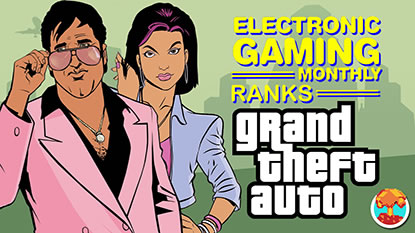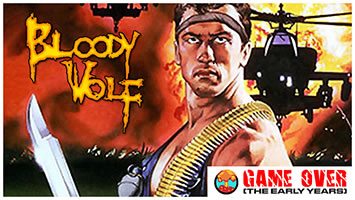- CLASSIC MAGAZINES
- REVIEW CREW
A show recapping what critics thought back
when classic games first came out! - NEXT GENERATION'S BEST & WORST
From the worst 1-star reviews to the best
5-stars can offer, this is Next Generation! - NINTENDO POWER (ARCHIVE)
Experience a variety of shows looking at the
often baffling history of Nintendo Power! - MAGAZINE RETROSPECTIVE
We're looking at the absolutely true history of
some of the most iconic game magazines ever! - SUPER PLAY'S TOP 600
The longest and most ambitious Super NES
countdown on the internet! - THEY SAID WHAT?
Debunking predictions and gossip found
in classic video game magazines! - NEXT GENERATION UNCOVERED
Cyril is back in this spin-off series, featuring the
cover critic review the art of Next Generation! - HARDCORE GAMER MAGAZING (PDF ISSUES)
Download all 36 issues of Hardcore Gamer
Magazine and relive the fun in PDF form!
- REVIEW CREW
- ELECTRONIC GAMING MONTHLY
- ELECTRONIC GAMING MONTHLY RANKS
From Mario to Sonic to Street Fighter, EGM
ranks classic game franchises and consoles! - ELECTRONIC GAMING MONTHLY BEST & WORST
Counting down EGM’s best and worst reviews
going year by year, from 1989 – 2009! - ELECTRONIC GAMING BEST & WORST AWARDS
11-part video series chronicling the ups and
downs of EGM’s Best & Worst Awards!
- ELECTRONIC GAMING MONTHLY RANKS
- GAME HISTORY
- GAME OVER: STORY BREAKDOWNS
Long-running series breaking down game
stories and analyzing their endings! - A BRIEF HISTORY OF GAMING w/ [NAME HERE]
Real history presented in a fun and pithy
format from a variety of game historians! - THE BLACK SHEEP
A series looking back at the black sheep
entries in popular game franchises! - INSTANT EXPERT
Everything you could possibly want to know
about a wide variety of gaming topics! - FREEZE FRAME
When something familiar happens in the games
industry, we're there to take a picture! - I'VE GOT YOUR NUMBER
Learn real video game history through a series
of number-themed episodes, starting at zero! - GREAT MOMENTS IN BAD ACTING
A joyous celebration of some of gaming's
absolute worst voice acting!
- GAME OVER: STORY BREAKDOWNS
- POPULAR SHOWS
- DG NEWS w/ LORNE RISELEY
Newsman Lorne Riseley hosts a regular
series looking at the hottest gaming news! - REVIEW REWIND
Cyril replays a game he reviewed 10+ years
ago to see if he got it right or wrong! - ON-RUNNING FEUDS
Defunct Games' longest-running show, with
editorials, observations and other fun oddities! - DEFUNCT GAMES QUIZ (ARCHIVE)
From online quizzes to game shows, we're
putting your video game knowledge to the test!- QUIZ: ONLINE PASS
Take a weekly quiz to see how well you know
the news and current gaming events! - QUIZ: KNOW THE GAME
One-on-one quiz show where contestants
find out if they actually know classic games! - QUIZ: THE LEADERBOARD
Can you guess the game based on the classic
review? Find out with The Leaderboard!
- QUIZ: ONLINE PASS
- DEFUNCT GAMES VS.
Cyril and the Defunct Games staff isn't afraid
to choose their favorite games and more! - CYRIL READS WORLDS OF POWER
Defunct Games recreates classic game
novelizations through the audio book format!
- DG NEWS w/ LORNE RISELEY
- COMEDY
- GAME EXPECTANCY
How long will your favorite hero live? We crunch
the numbers in this series about dying! - VIDEO GAME ADVICE
Famous game characters answer real personal
advice questions with a humorous slant! - FAKE GAMES: GUERILLA SCRAPBOOK
A long-running series about fake games and
the people who love them (covers included)! - WORST GAME EVER
A contest that attempts to create the worst
video game ever made, complete with covers! - LEVEL 1 STORIES
Literature based on the first stages of some
of your favorite classic video games! - THE COVER CRITIC
One of Defunct Games' earliest shows, Cover
Critic digs up some of the worst box art ever! - COMMERCIAL BREAK
Take a trip through some of the best and
worst video game advertisements of all time! - COMIC BOOK MODS
You've never seen comics like this before.
A curious mix of rewritten video game comics!
- GAME EXPECTANCY
- SERIES ARCHIVE
- NINTENDO SWITCH ONLINE ARCHIVE
A regularly-updated list of every Nintendo
Switch Online release, plus links to review! - PLAYSTATION PLUS CLASSIC ARCHIVE
A comprehensive list of every PlayStation
Plus classic release, including links! - RETRO-BIT PUBLISHING ARCHIVE
A regularly-updated list of every Retro-Bit
game released! - REVIEW MARATHONS w/ ADAM WALLACE
Join critic Adam Wallace as he takes us on a
classic review marathon with different themes!- DEFUNCT GAMES GOLF CLUB
Adam Wallace takes to the links to slice his way
through 72 classic golf game reviews! - 007 IN PIXELS
Adam Wallace takes on the world's greatest spy
as he reviews 15 weeks of James Bond games! - A SALUTE TO VAMPIRES
Adam Wallace is sinking his teeth into a series
covering Castlevania, BloodRayne and more! - CAPCOM'S CURSE
Adam Wallace is celebrating 13 days of Halloween
with a line-up of Capcom's scariest games! - THE FALL OF SUPERMAN
Adam Wallace is a man of steel for playing
some of the absolute worst Superman games! - THE 31 GAMES OF HALLOWEEN
Adam Wallace spends every day of October afraid
as he reviews some of the scariest games ever! - 12 WEEKS OF STAR TREK
Adam Wallace boldly goes where no critic has
gone before in this Star Trek marathon!
- DEFUNCT GAMES GOLF CLUB
- DAYS OF CHRISTMAS (ARCHIVE)
Annual holiday series with themed-episodes
that date all the way back to 2001!- 2015: 30 Ridiculous Retro Rumors
- 2014: 29 Magazines of Christmas
- 2013: 29 Questionable Power-Ups of Christmas
- 2012: 34 Theme Songs of Christmas
- 2011: 32 Game Endings of Christmas
- 2010: 31 Bonus Levels of Christmas
- 2009: 30 Genres of Christmas
- 2008: 29 Controls of Christmas
- 2007: 34 Cliches of Christmas
- 2006: 33 Consoles of Christmas
- 2005: 32 Articles of Christmas
- 2004: 31 Websites of Christmas
- 2003: 29 Issues of Christmas
- 2002: 28 Years of Christmas
- 2001: 33 Days of Christmas
- NINTENDO SWITCH ONLINE ARCHIVE
- REVIEW ARCHIVE
- FULL ARCHIVE
The Baer Necessities

Ralph Baer: Creator of the video game and fan of extremely heavy blue suits!
Most people think video games and they think Nolan Bushnell and Atari. Most of us "old gamers" grew up with an Atari 2600 in the house, so it only makes sense that it all started
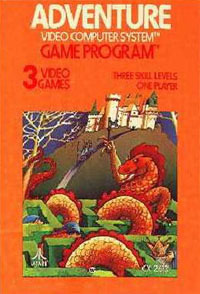
Adventure may be primative by today's standards, but it is not the beginning of this story!
To understand the origins of home video games, there are two names you definitely need to know: Ralph Baer and Sanders Associates. Baer, a German immigrant, received a degree in Television Engineering and took a job with a small defense contractor: Sanders Associates. Even in the very beginning, there was a link between gaming and the military, but it was a deceptive link. All of Baer's work for Sanders Associates for his gaming was "skunk work," completely unrelated to the military contracts that the company mainly took on. In 1966, as the division manager with a massive labor payroll, he could get away with this and
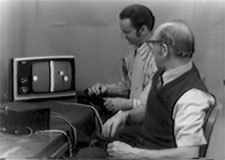
Here Ralph plays his Brown Box on the smallest television he could find!
Wait a second! Didn't Atari do Pong and launch home gaming? Yes and no.
See, Sanders Associates sold the manufacturing rights of their video game machine (company downsizing made Baer desperate) to Magnavox. Magnavox, in their infinite wisdom, paid a fair bit of money for the rights, named it the Odyssey, and then did everything in their power to keep anyone from buying one. According to Baer, they "upped the price phenomenally so that the damn thing sold for $100!" He wanted it to be $19.95. They also only showed the system being played on Magnavox television, which made people think those televisions
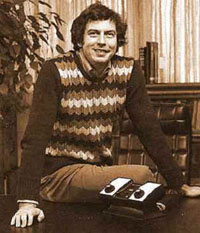
While he's most certainly an important figure in the video game arena, Nolan Bushnell is NOT the grandfather of video games!
So with Magnavox dropping the ball left and right, the games industry might have started, and ended, in 1971 with the release of the Odyssey. It would take a tall man from Utah, who in reality honed his trade as a midway hawker, to take the industry to the next step. That man was Nolan Bushnell, founder of Atari. He created a few arcade machines early on, all of which were universal failures (his Computer Space for Nutting Associates used a manual with so
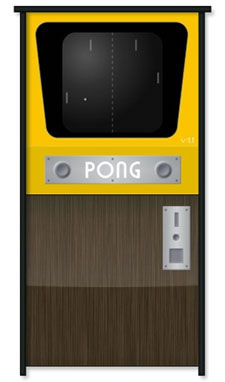
Sure it's ugly by today's standards, but what other arcade game forced you to find a second person to play with? If you ask me this is the perfect way to pick up girls at the bar!
Bushnell didn't stop there in taking the designs of others and making them his own. He also claimed to be the creator of Pong on numerous occasions, despite the fact that it was actually designed by Al Alcorn. Bushnell gave Alcorn the assignment of

Penny is having a much better Chuck E Cheese experience than I had the other day!
Actually, his Computer Space machine was a direct rip-off of Spacewar!, which was created in 1961 at MIT by Steve Russell along with other members of the Tech Model Railroad Club, to run on the
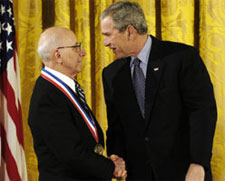
I bet you didn't expect to see George W. Bush in a video game history lesson!
Bushnell liked to call himself the "father of video games," which made for good press. Don't get me wrong, though. In some ways, he is accurate in calling himself that. Video games, as we know them today, wouldn't be around without Bushnell's marketing savvy. Even years later, when he formed Chuck E Cheese Pizza, he made sure to put video games in every restaurant. He helped make video games popular and "cool" for both home and arcade use. He might never have gotten the idea to take the living room by storm, however, without the years of effort and experiments that Baer put into developing the Odyssey. Don't feel too bad for Baer, though, since you've probably enjoyed his handheld called the Simon, the technology behind light guns, cable television transmitted gaming, talking picture frames, Talking Tools for Hasbro, and interactive VHS technology. With over seventy patents, Mr. Baer continues to do interviews and look for new creation opportunities. He was finally recognized officially in 2006 when he received the National Medal of Technology from President Bush for inventing the game console and launching the industry that we know and love today. His early prototypes are even displayed in the Smithsonian. So yeah, he's done alright for himself.
The Ultimate History of Video Games, Stephen L. Kent
Video Games: In the Beginning, Ralph Baer
The Internet in general. Thanks, Internet!
HOME |
CONTACT |
NOW HIRING |
WHAT IS DEFUNCT GAMES? |
NINTENDO SWITCH ONLINE |
RETRO-BIT PUBLISHING
Retro-Bit |
Switch Planet |
The Halcyon Show |
Same Name, Different Game |
Dragnix |
Press the Buttons
Game Zone Online | Hardcore Gamer | The Dreamcast Junkyard | Video Game Blogger
Dr Strife | Games For Lunch | Mondo Cool Cast | Boxed Pixels | Sega CD Universe | Gaming Trend
Game Zone Online | Hardcore Gamer | The Dreamcast Junkyard | Video Game Blogger
Dr Strife | Games For Lunch | Mondo Cool Cast | Boxed Pixels | Sega CD Universe | Gaming Trend
Copyright © 2001-2025 Defunct Games
All rights reserved. All trademarks are properties of their respective owners.
All rights reserved. All trademarks are properties of their respective owners.













